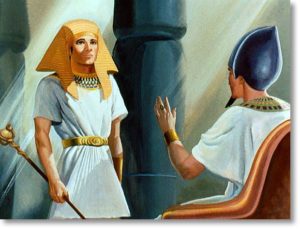When Jesus healed a man at the pool of Bethesda, he commanded him to, “Get up, pick up your pallet and walk.” When the self-righteous Jews found out what Jesus had done, they began persecuting him because it had occurred on the Sabbath.[1] What infuriated them even more was Jesus’ response to their aggression:
John 5:17-18 (NASB) But He answered them, “My Father is working until now, and I Myself am working.” 18 For this reason therefore the Jews were seeking all the more to kill Him, because He not only was breaking the Sabbath, but also was calling God His own Father, making Himself equal with God. (emphasis added)
What does it mean to be equal with God?
Some interpret the Jews’ charge that Jesus was “making himself equal with God” as proof that he was claiming to be deity, especially in light of their vehement reaction. But is this what they would have understood him to be saying? Did they think Jesus was claiming to share the same God-essence as the Father? In this post, we will examine the context of John 5 in view of traditional Hebraic thought. In the process, we’ll discover the meaning of Jesus’ words and what the Jews understood him to say.
As we learned in The Principle of Agency in the New Testament, an agent is one who has been “authorized to act for or in the place of another.”[2] In Hebraic terms, the agent or the “one sent” is called the shaliah.[3] Regarding agency, James McGrath, professor and New Testament scholar writes:
Agency was an important part of every day life in the ancient world. Individuals such as prophets and angels mentioned in the Jewish Scriptures were thought of as ‘agents’ of God. And the key idea regarding agency in the ancient world appears to be summarized in the phrase from rabbinic literature so often quoted in these contexts: “The one sent is like the one who sent him.” [4] (emphasis added)
The Encyclopedia of Jewish Religion explains it this way:
The main point of the Jewish law of agency is expressed in the dictum, “a person’s agent is regarded as the person himself.” Therefore, any act committed by a duly appointed agent is regarded as having been committed by the principal…[5] (emphasis added)
 Thus, when Jesus said, “My Father is working until now, and I myself am working,” the Jews rightly interpreted his claim to be one of agency or functional equality with God. In the Jewish principle of agency, one can be “equal” with God without being God because the agent functions as the sender.
Thus, when Jesus said, “My Father is working until now, and I myself am working,” the Jews rightly interpreted his claim to be one of agency or functional equality with God. In the Jewish principle of agency, one can be “equal” with God without being God because the agent functions as the sender.
Agency is the Focus of the Narrative
It would be anachronistic to say that the first century, fiercely monotheistic Jews interpreted Jesus’ words to mean he was literally claiming to be God. There is nothing in the context that even suggests that they were referring to an equality of substance or being. Instead, the theme of chapter five and the focus of Jesus’ defense before the hostile Jews, is that he had been sent by God, not that he is God. For instance, six times in chapter five alone, Jesus emphasizes that he has been sent by God.[6] Furthermore, as God’s agent, Jesus freely admitted that he could do nothing on his own, but did only what the Father willed:
John 5:19 (NASB) Therefore Jesus answered and was saying to them, “Truly, truly, I say to you, the Son can do nothing of Himself, unless it is something He sees the Father doing; for whatever the Father does, these things the Son also does in like manner. (emphasis added)
John 5:26-27 (NASB) 26 “For just as the Father has life in Himself, even so He gave to the Son also to have life in Himself; 27 and He gave Him authority to execute judgment, because He is the Son of Man. (emphasis added)
John 5:30 (NASB) “I can do nothing on My own initiative. As I hear, I judge; and My judgment is just, because I do not seek My own will, but the will of Him who sent Me. (emphasis added)
Do these sound like statements Almighty God would make? On the contrary, they express agency, not deity. If Jesus is God, he could not be given authority by God because he would inherently posses it. Also, it would not make sense that as God he did only what he was directed to do, or that his will could be different from the One who sent him.[7] On the other hand, as God’s human agent, Jesus would require delegated authority to accomplish the works God had given him to do as the Messiah. Indeed, the works themselves testified of his agency:
John 5:36 (NASB) “But the testimony which I have is greater than the testimony of John; for the works which the Father has given Me to accomplish—the very works that I do—testify about Me, that the Father has sent Me. (emphasis added)
 Not surprisingly, this accreditation is consistent throughout the New Testament:
Not surprisingly, this accreditation is consistent throughout the New Testament:
John 14:10 (NASB) 10 “Do you not believe that I am in the Father, and the Father is in Me? The words that I say to you I do not speak on My own initiative, but the Father abiding in Me does His works (emphasis added)
John 17:4 (NASB) “I glorified You on the earth, having accomplished the work which You have given Me to do. (emphasis added)
Acts 2:22 (NASB) “Men of Israel, listen to these words: Jesus the Nazarene, a man attested to you by God with miracles and wonders and signs which God performed through Him in your midst, just as you yourselves know—(emphasis added)
Acts 10:38 (NASB) “You know of Jesus of Nazareth, how God anointed Him with the Holy Spirit and with power, and how He went about doing good and healing all who were oppressed by the devil, for God was with Him. (emphasis added)
Jesus did not claim to be God
In John chapter 5, the problem was not that the Jews thought Jesus was claiming to be God, but that they refused to accept that he came from God. Or to put it another way, they refused to accept that he was God’s agent and thus His functional equal.
John 5:38 (NASB) “You do not have His word abiding in you, for you do not believe Him whom He sent.
John 5:39-40 (NASB) “You search the Scriptures because you think that in them you have eternal life; it is these that testify about Me; 40 and you are unwilling to come to Me so that you may have life.
John 5:43 (NASB) “I have come in My Father’s name, and you do not receive Me; if another comes in his own name, you will receive him.
John 5:46-47 (NASB) “For if you believed Moses, you would believe Me, for he wrote about Me. 47 “But if you do not believe his writings, how will you believe My words?”

Wikipedia.com
James McGrath, professor of New Testament studies, identifies this as the reason the Jews were so offended:
“The Johannine conflict with `the Jews’ over Christology was not about Jesus performing divine functions per se. If Jesus was God’s appointed, subordinate, obedient agent, then he could clearly do such things legitimately. The problem is that `the Jews’ do not recognize Jesus as God’s agent. In their view, he is an upstart, one of a number of messianic pretenders and glory-seekers to appear on the scene during this period of Jewish history. If Jesus is the Messiah, then his actions are legitimate, because he is God’s agent… (emphasis added)
The issue is therefore not ‘equality with God’ per se, but whether Jesus makes himself equal to God. God could appoint agents, who would represent him and bear his full authority (examples include Moses, the judges and various principal angelic figures). It was only when someone who had not been appointed by God tried to put himself on a par with God (like Adam, Pharaoh or the king of Babylon in the Jewish Scriptures) that equality with God became problematic and even blasphemous; and it was into this latter category that `the Jews’ placed Jesus.[8] (emphasis added)
Functional Equality
To facilitate a better understanding of the Hebraic concept of Jesus’ agency and equality with God, it will help to recall Joseph’s agency under Pharaoh. When the son of Jacob interpreted Pharaoh’s dreams and gave him counsel regarding the coming famine, the Egyptian king exalted him to second in command:
Genesis 41:38-40 and 55 (NASB) Then Pharaoh said to his servants, “Can we find a man like this, in whom is a divine spirit?” 39 So Pharaoh said to Joseph, “Since God has informed you of all this, there is no one so discerning and wise as you are. 40 “You shall be over my house, and according to your command all my people shall do homage; only in the throne I will be greater than you.” (emphasis added)
 Pharaoh delegated all authority to Joseph and all the people were to “do homage” or honor him as the king’s agent or representative. In like manner, Jesus said of his own agency:
Pharaoh delegated all authority to Joseph and all the people were to “do homage” or honor him as the king’s agent or representative. In like manner, Jesus said of his own agency:
John 5:22-23 (NASB) “For not even the Father judges anyone, but He has given all judgment to the Son, 23 so that all will honor the Son even as they honor the Father. He who does not honor the Son does not honor the Father who sent Him. (emphasis added)
Later, when Joseph’s brothers came to Egypt during the famine to secure grain, they understood that Joseph had been given Pharaoh’s authority to act on his behalf and was thus functionally equal to the king:
Genesis 44:18 (NASB) Then Judah approached him [Joseph], and said, “Oh my lord, may your servant please speak a word in my lord’s ears, and do not be angry with your servant; for you are equal to Pharaoh. (emphasis added)
Joseph’s brothers didn’t literally think he was Pharaoh, nor did they think he shared Pharaoh’s essence. Instead, they understood the principle of agency. Joseph was Pharaoh in a representative way. He was equal to the Egyptian monarch because he was functioning or acting in his delegated authority.
Genesis 41:55 (NASB) So when all the land of Egypt was famished, the people cried out to Pharaoh for bread; and Pharaoh said to all the Egyptians, “Go to Joseph; whatever he says to you, you shall do.” (emphasis added)

Theologian Marianne Meye Thompson’s explanation of Jewish agency helps us further understand how Jesus’ agency would have been seen as equality with God who sent him:
A common saying in the rabbis was “the one who is sent is like the one who sent him” or “a man’s agent is equivalent to himself“. Because the saliah [shaliah] may act on behalf of the one who sent him, when one deals with the saliah [shaliah] it is as if one is dealing with the one who sent that person.[9] (emphasis added)
As Joseph functioned as Pharaoh’s equal, Jesus came in his Father’s name, and functioned on behalf of his God:
John 5:43 (NASB) “I have come in My Father’s name, and you do not receive Me; if another comes in his own name, you will receive him. (emphasis added)
This is problematic if Jesus is God. As deity, surely he would come in his own name and authority, and he would do his own works and make his own judgments. But he didn’t. He came in the name of the One who sent him. But if Jesus is the Messiah, the human agent of God, it makes complete sense to say he did not come on his own.
Further evidence of Jesus’ agency
Perhaps the most concerning statement in the entire exchange between Jesus and his persecutors is one about motivation:
John 5:41-44 (NASB) “I do not receive glory from men; 42 but I know you, that you do not have the love of God in yourselves. 43 “I have come in My Father’s name, and you do not receive Me; if another comes in his own name, you will receive him. 44 “How can you believe, when you receive glory from one another and you do not seek the glory that is from the one and only God? (emphasis added)
Jesus plainly stated that he does not receive glory from men. If Jesus is God, he would not be able to say this as God most certainly receives glory from men. In fact, God judges those who refuse to glorify Him.[10] But if Jesus is God’s representative, it is an appropriate statement.
Is Jesus equal with God? Yes, but in a representative way, serving as God’s agent in much the same way that Joseph served under Pharaoh. However, Jesus is not equal in essence or being, as this is never taught in Scripture. Even though Joseph was functionally equal to Pharaoh, the king was greater than his agent:
Genesis 41:40 (NASB) “You shall be over my house, and according to your command all my people shall do homage; only in the throne I will be greater than you.” (emphasis added)
Likewise, Jesus said of the One who sent him:
John 14:28 (NASB) …the Father is greater than I. (emphasis added)
[1] John 5:16
[2] “agent,” Merriam Webster Dictionary, accessed 06-16-19, https://www.merriam-webster.com/dictionary/agent
[3] Also spelled: shaliach, saliah, salah.
[4] James F. McGrath, The Only True God: Early Christian Monotheism in its Jewish Context, (University of Illinois Press, 2009) p. 14.
[5] “Agent” (Heb. Shaliah), The Encyclopedia of Jewish Religion, R.J.Z. Werblowsky, G. Wigoder, (New York: Adama Books, 1986), p. 15.
[6] John 5:23, 24, 30, 36, 37, 38.
[7] John 6:38-39 (NASB) “For I have come down from heaven, not to do My own will, but the will of Him who sent Me.
[8] James McGrath, John’s Apologetic Christology, (New York, NY: Cambridge University Press, 2001), p. 77-79
[9] Marianne Meye Thompson, “Gospel of John,” in Dictionary of Jesus and the Gospels, Joel B. Green, ed. 1992 (Downers Grove, IL: Intervarsity Press, 1992), p. 377
[10] Men glorify God: Psalm 29:2; 115:1; Luke 17:18; Revelation 4:11; 14:7; Judgment for refusing to glorify God: Acts 12:23, etc.




very helpful thank you
Thanks, Annie, for reading and commenting! I’m glad the information was helpful!
God bless,
OGW
“Before Abraham was, I Am!”
And the Word was God!
“My Lord and my God!”
“Let all God’s angels worship Him!”
“Lord, I believe” and he worshipped Him.
“I am the first and the last”
“I am the alpha and the Omega”
“I am coming soon!”
“Be ready!”
Thanks for sharing, Bob. Here is my response to the partial quotes you listed.
“Before Abraham was, I Am!”
And the Word was God!
“My Lord and my God!”
“Lord, I believe” and he worshipped Him.
“I am the alpha and the Omega”
Hope you’ll read each one and follow up.
Blessings,
OGW